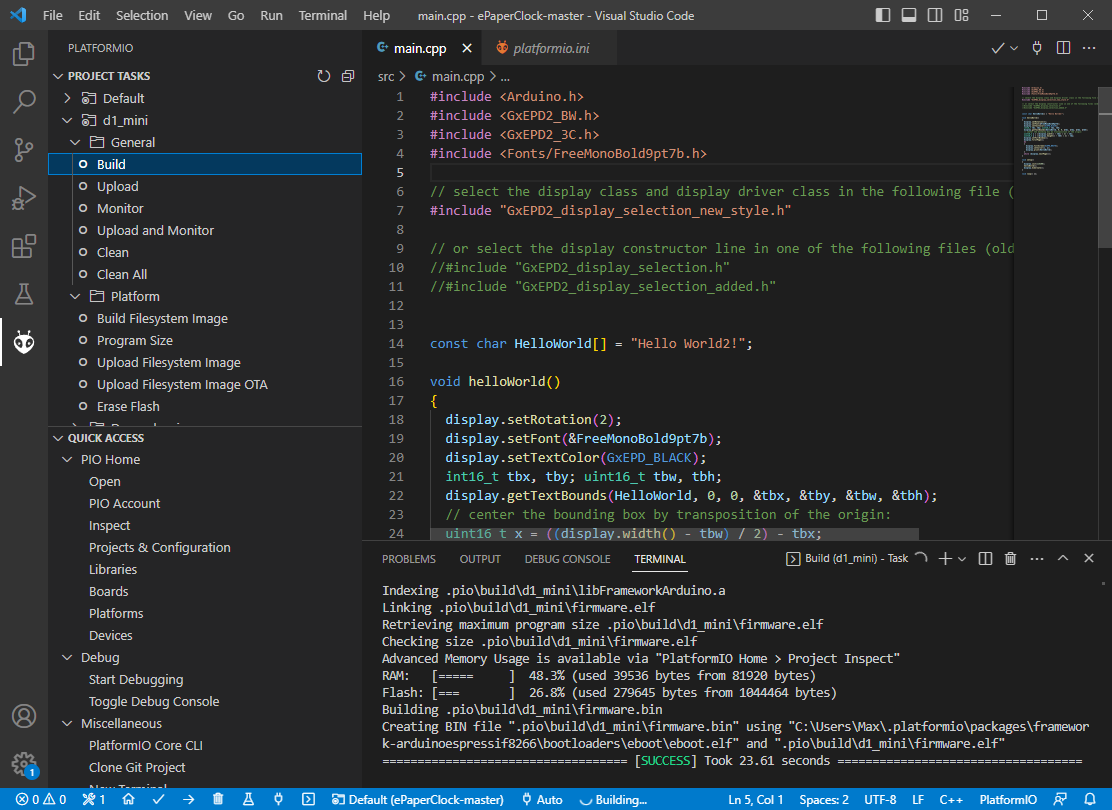Thanks a lot for taking the time to check it out. It is reassuring to know it works on your computer.
However, I’ve tried doing as you suggested, with no success (I still get the exact same errors).
I thought it could be some configuration problem on my PlatformIo.
For reference, here is my c_pp_properties.json.
Do you notice anything weird perhaps?
//
// !!! WARNING !!! AUTO-GENERATED FILE!
// PLEASE DO NOT MODIFY IT AND USE "platformio.ini":
// https://docs.platformio.org/page/projectconf/section_env_build.html#build-flags
//
{
"configurations": [
{
"name": "PlatformIO",
"includePath": [
"c:/Users/luisd/Documents/PlatformIO/Projects/ePaperClock/include",
"c:/Users/luisd/Documents/PlatformIO/Projects/ePaperClock/src",
"c:/Users/luisd/Documents/PlatformIO/Projects/ePaperClock/.pio/libdeps/d1_mini/GxEPD2/src",
"c:/Users/luisd/Documents/PlatformIO/Projects/ePaperClock/.pio/libdeps/d1_mini/Adafruit GFX Library",
"c:/Users/luisd/Documents/PlatformIO/Projects/ePaperClock/.pio/libdeps/d1_mini/Adafruit BusIO",
"C:/Users/luisd/.platformio/packages/framework-arduinoespressif8266/libraries/SPI",
"C:/Users/luisd/.platformio/packages/framework-arduinoespressif8266/libraries/Wire",
"C:/Users/luisd/.platformio/packages/framework-arduinoespressif8266/tools/sdk/include",
"C:/Users/luisd/.platformio/packages/framework-arduinoespressif8266/tools/sdk/libc/xtensa-lx106-elf/include",
"C:/Users/luisd/.platformio/packages/framework-arduinoespressif8266/cores/esp8266",
"C:/Users/luisd/.platformio/packages/framework-arduinoespressif8266/tools/sdk/lwip2/include",
"C:/Users/luisd/.platformio/packages/framework-arduinoespressif8266/variants/d1_mini",
"C:/Users/luisd/.platformio/packages/framework-arduinoespressif8266/libraries/ArduinoOTA",
"C:/Users/luisd/.platformio/packages/framework-arduinoespressif8266/libraries/DNSServer/src",
"C:/Users/luisd/.platformio/packages/framework-arduinoespressif8266/libraries/EEPROM",
"C:/Users/luisd/.platformio/packages/framework-arduinoespressif8266/libraries/ESP8266AVRISP/src",
"C:/Users/luisd/.platformio/packages/framework-arduinoespressif8266/libraries/ESP8266HTTPClient/src",
"C:/Users/luisd/.platformio/packages/framework-arduinoespressif8266/libraries/ESP8266HTTPUpdateServer/src",
"C:/Users/luisd/.platformio/packages/framework-arduinoespressif8266/libraries/ESP8266LLMNR",
"C:/Users/luisd/.platformio/packages/framework-arduinoespressif8266/libraries/ESP8266NetBIOS",
"C:/Users/luisd/.platformio/packages/framework-arduinoespressif8266/libraries/ESP8266SSDP",
"C:/Users/luisd/.platformio/packages/framework-arduinoespressif8266/libraries/ESP8266SdFat/src",
"C:/Users/luisd/.platformio/packages/framework-arduinoespressif8266/libraries/ESP8266WebServer/src",
"C:/Users/luisd/.platformio/packages/framework-arduinoespressif8266/libraries/ESP8266WiFi/src",
"C:/Users/luisd/.platformio/packages/framework-arduinoespressif8266/libraries/ESP8266WiFiMesh/src",
"C:/Users/luisd/.platformio/packages/framework-arduinoespressif8266/libraries/ESP8266httpUpdate/src",
"C:/Users/luisd/.platformio/packages/framework-arduinoespressif8266/libraries/ESP8266mDNS/src",
"C:/Users/luisd/.platformio/packages/framework-arduinoespressif8266/libraries/Ethernet/src",
"C:/Users/luisd/.platformio/packages/framework-arduinoespressif8266/libraries/GDBStub/src",
"C:/Users/luisd/.platformio/packages/framework-arduinoespressif8266/libraries/Hash/src",
"C:/Users/luisd/.platformio/packages/framework-arduinoespressif8266/libraries/LittleFS/src",
"C:/Users/luisd/.platformio/packages/framework-arduinoespressif8266/libraries/SD/src",
"C:/Users/luisd/.platformio/packages/framework-arduinoespressif8266/libraries/SDFS/src",
"C:/Users/luisd/.platformio/packages/framework-arduinoespressif8266/libraries/SPISlave/src",
"C:/Users/luisd/.platformio/packages/framework-arduinoespressif8266/libraries/Servo/src",
"C:/Users/luisd/.platformio/packages/framework-arduinoespressif8266/libraries/SoftwareSerial/src",
"C:/Users/luisd/.platformio/packages/framework-arduinoespressif8266/libraries/TFT_Touch_Shield_V2",
"C:/Users/luisd/.platformio/packages/framework-arduinoespressif8266/libraries/Ticker/src",
"C:/Users/luisd/.platformio/packages/framework-arduinoespressif8266/libraries/esp8266/src",
""
],
"browse": {
"limitSymbolsToIncludedHeaders": true,
"path": [
"c:/Users/luisd/Documents/PlatformIO/Projects/ePaperClock/include",
"c:/Users/luisd/Documents/PlatformIO/Projects/ePaperClock/src",
"c:/Users/luisd/Documents/PlatformIO/Projects/ePaperClock/.pio/libdeps/d1_mini/GxEPD2/src",
"c:/Users/luisd/Documents/PlatformIO/Projects/ePaperClock/.pio/libdeps/d1_mini/Adafruit GFX Library",
"c:/Users/luisd/Documents/PlatformIO/Projects/ePaperClock/.pio/libdeps/d1_mini/Adafruit BusIO",
"C:/Users/luisd/.platformio/packages/framework-arduinoespressif8266/libraries/SPI",
"C:/Users/luisd/.platformio/packages/framework-arduinoespressif8266/libraries/Wire",
"C:/Users/luisd/.platformio/packages/framework-arduinoespressif8266/tools/sdk/include",
"C:/Users/luisd/.platformio/packages/framework-arduinoespressif8266/tools/sdk/libc/xtensa-lx106-elf/include",
"C:/Users/luisd/.platformio/packages/framework-arduinoespressif8266/cores/esp8266",
"C:/Users/luisd/.platformio/packages/framework-arduinoespressif8266/tools/sdk/lwip2/include",
"C:/Users/luisd/.platformio/packages/framework-arduinoespressif8266/variants/d1_mini",
"C:/Users/luisd/.platformio/packages/framework-arduinoespressif8266/libraries/ArduinoOTA",
"C:/Users/luisd/.platformio/packages/framework-arduinoespressif8266/libraries/DNSServer/src",
"C:/Users/luisd/.platformio/packages/framework-arduinoespressif8266/libraries/EEPROM",
"C:/Users/luisd/.platformio/packages/framework-arduinoespressif8266/libraries/ESP8266AVRISP/src",
"C:/Users/luisd/.platformio/packages/framework-arduinoespressif8266/libraries/ESP8266HTTPClient/src",
"C:/Users/luisd/.platformio/packages/framework-arduinoespressif8266/libraries/ESP8266HTTPUpdateServer/src",
"C:/Users/luisd/.platformio/packages/framework-arduinoespressif8266/libraries/ESP8266LLMNR",
"C:/Users/luisd/.platformio/packages/framework-arduinoespressif8266/libraries/ESP8266NetBIOS",
"C:/Users/luisd/.platformio/packages/framework-arduinoespressif8266/libraries/ESP8266SSDP",
"C:/Users/luisd/.platformio/packages/framework-arduinoespressif8266/libraries/ESP8266SdFat/src",
"C:/Users/luisd/.platformio/packages/framework-arduinoespressif8266/libraries/ESP8266WebServer/src",
"C:/Users/luisd/.platformio/packages/framework-arduinoespressif8266/libraries/ESP8266WiFi/src",
"C:/Users/luisd/.platformio/packages/framework-arduinoespressif8266/libraries/ESP8266WiFiMesh/src",
"C:/Users/luisd/.platformio/packages/framework-arduinoespressif8266/libraries/ESP8266httpUpdate/src",
"C:/Users/luisd/.platformio/packages/framework-arduinoespressif8266/libraries/ESP8266mDNS/src",
"C:/Users/luisd/.platformio/packages/framework-arduinoespressif8266/libraries/Ethernet/src",
"C:/Users/luisd/.platformio/packages/framework-arduinoespressif8266/libraries/GDBStub/src",
"C:/Users/luisd/.platformio/packages/framework-arduinoespressif8266/libraries/Hash/src",
"C:/Users/luisd/.platformio/packages/framework-arduinoespressif8266/libraries/LittleFS/src",
"C:/Users/luisd/.platformio/packages/framework-arduinoespressif8266/libraries/SD/src",
"C:/Users/luisd/.platformio/packages/framework-arduinoespressif8266/libraries/SDFS/src",
"C:/Users/luisd/.platformio/packages/framework-arduinoespressif8266/libraries/SPISlave/src",
"C:/Users/luisd/.platformio/packages/framework-arduinoespressif8266/libraries/Servo/src",
"C:/Users/luisd/.platformio/packages/framework-arduinoespressif8266/libraries/SoftwareSerial/src",
"C:/Users/luisd/.platformio/packages/framework-arduinoespressif8266/libraries/TFT_Touch_Shield_V2",
"C:/Users/luisd/.platformio/packages/framework-arduinoespressif8266/libraries/Ticker/src",
"C:/Users/luisd/.platformio/packages/framework-arduinoespressif8266/libraries/esp8266/src",
""
]
},
"defines": [
"PLATFORMIO=60106",
"ESP8266",
"ARDUINO_ARCH_ESP8266",
"ARDUINO_ESP8266_WEMOS_D1MINI",
"F_CPU=80000000L",
"__ets__",
"ICACHE_FLASH",
"ARDUINO=10805",
"ARDUINO_BOARD=\"PLATFORMIO_D1_MINI\"",
"FLASHMODE_DIO",
"LWIP_OPEN_SRC",
"NONOSDK22x_190703=1",
"TCP_MSS=536",
"LWIP_FEATURES=1",
"LWIP_IPV6=0",
"VTABLES_IN_FLASH",
""
],
"cStandard": "c99",
"cppStandard": "c++11",
"compilerPath": "C:/Users/luisd/.platformio/packages/toolchain-xtensa/bin/xtensa-lx106-elf-gcc.exe",
"compilerArgs": [
"-mlongcalls",
"-mtext-section-literals",
""
]
}
],
"version": 4
}
![]()
